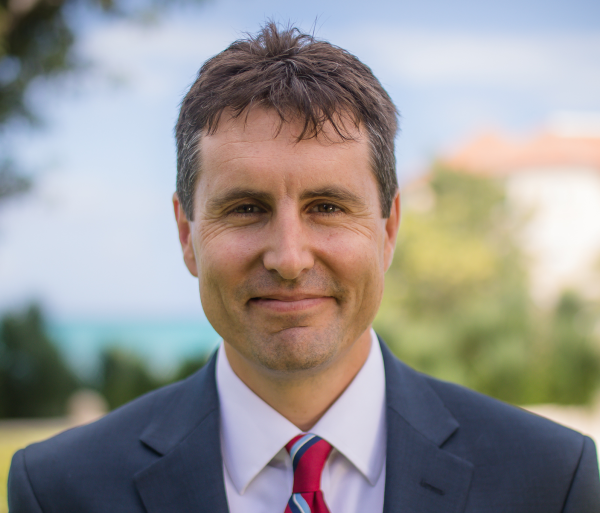
Pat talks with Dr. Michael Rota, professor of philosophy at the University of St. Thomas, on one of the most controversial but intriguing arguments for the reasonableness of committing to a religious life: Pascal’s Wager. Dr. Rota is the author of the book Taking Pascal’s Wager: Faith, Evidence, and the Abundant Life, where he offers an updated formulation of the argument, responds to common objections, and presents a case for the truth of the Christian faith.
Should You Take Pascal’s Wager?
OR, ==> CLICK HERE TO DOWNLOAD THE EPISODE.
About Dr. Michael Rota

From his website: “I’m a Professor of Philosophy at the University of St. Thomas (Minnesota) and a Program Officer at the Templeton Religion Trust. In my recent book Taking Pascal’s Wager, I give an extended argument for the reasonableness and desirability of Christian commitment. From 2010-2016 Dean Zimmerman and I co-organized the St. Thomas Summer Seminars in Philosophy of Religion and Philosophical Theology. I’m currently working with the sociologist Kevin Bales on a book on slavery and religion.”
Recommended Reading and Related Episodes
Taking Pascal’s Wager: Faith, Evidence, and the Abundant Life – Dr. Michael Rota
The Problem of Evil – Peter Van Inwagen
Wandering In Darkness: Narrative and the Problem of Suffering – Eleanor Stump
Ed Feser on Proofs for the Existence of God
God and Science, Near Death Experiences, and How to Suffer Well – with Fr. Robert Spitzer
Answer Today’s Most Challenging Religious Questions with Fr. Thomas Joseph White
…
The Pat Flynn Show
If you enjoyed this episode, it would mean the world to me if you could subscribe to, and leave a review for, The Pat Flynn show on iTunes HERE or Stitcher HERE.
Reading your reviews and hearing your feedback is what keeps me fired up to make The Pat Flynn Show happen. Thank you!
Hi Pat and Michael. I remember sitting in Catholic Church decades ago and a visiting priest talked about his faith and basically said he had everything to gain and nothing to lose by choosing Jesus Christ. I’ve heard this argument from other people of different faiths but didn’t know there was an official name for it, i.e. Pascal’s Wager. Being the curious cat I am, I went on Wikipedia and looked up Pascal’s Wager and learned it deals with things such as probability theory and decision theory. Pretty darn cool!
I’m glad the conversation got you intrigued, Leslie. This argument, as I’m sure you’ve discovered, has a rich and controversial history. But what appeals to me about Dr. Rota’s version is it doesn’t focus on belief, but seeking and action. This helps overcome various “insincerity” objections (since you can’t really force yourself to believe something you’re unsure about, but certainly you can make a commitment to seeking), and actually asks more of the person on a day to day basis. It’s not like this version has to do with signing a paper saying “yes” to Jesus (which I think is a common misconception) and then keeping everything about your life the same; rather it has to do with living a life that is deeply religious in nature, which various studies confirm have many “this-worldly” benefits. Anyway! Thanks for chiming in : )
Thank YOU. I’d agree there’s a big difference between just believing and walking the walk. Fun discussion.
I have mixed feelings about Pascal’s Wager. I understand that Pascal’s Wager isn’t a religious argument but more of an intellectual exercise. I’m going to set that aside and approach it from a religious perspective. I think there are some arguments to be made that there is some cost to believing in Jesus Christ and following Him. Jesus Himself talked about how the world will hate you and persecute you. Furthermore, there are some aspects of Christianity that people might not like such as the requirements for sex in marriage. While I think Christianity has much to offer, I think it carries some consequences, especially if there is no Hell. I’d love to hear people’s thoughts on this.
I was the same way for a while, which I admitted to Dr. Rota on the show. I just never paid much attention to PW, because I was convinced by other arguments, so never really felt the need for it. But the way Dr. Rota presents it makes a compelling case (I think) and is something I wish was presented to me when I was younger, because, if nothing else, it may have gotten me interested in exploring the religious question a lot sooner than I did. As for the costs, certainly they exist, but the interesting thing to note is all the research Dr. Rota explores in his book, of how living a religious life actually produces more “this-worldly” benefits than people expect, especially in terms of subjective well-being and overall health. Naturally, even if these benefits didn’t exist, one could still run the argument, but the fact that we now have the empirical evidence to support the many goods that come with religious living in this life, only makes the case more compelling, I think. In other words, even if this life is all there is, your chances of being happy and living longer are still better when living a life of religious seeking and commitment, than not.
You and your guest make some good points. It’s something I have to think about but I appreciate you taking the time to reply to my comments. Not every blogger or podcaster responds to comments.
Pascal’s Wager, a time when intellectual giants walked the earth. Sadly, such giants seem to be a dying breed which is why it’s refreshing to listen to you and your guests Pat. There are some intelligent people left who know how to make a logical and reasoned argument. I know Pascal’s Wager is controversial, but I like how you explained it and its relation to faith. For me, the correlation between well-being and religion is obvious. I have seen people who have followed their faith for a long time (as opposed to people whose faith changes like the weather) and they generally seem happy. Any rational person is going to understand bad things happen to everyone, but religious faith (and living the religious faith) helps get you through things that might break the non-religious. Again, bear in mind I’m not talking about someone who says, “I’m a Catholic” or “I’m a Protestant,” but talking about someone who believes and follows the Lord and His teachings. Thanks for enlightening us Dr. Rota! I like how you deal with people’s concerns about following Jesus.